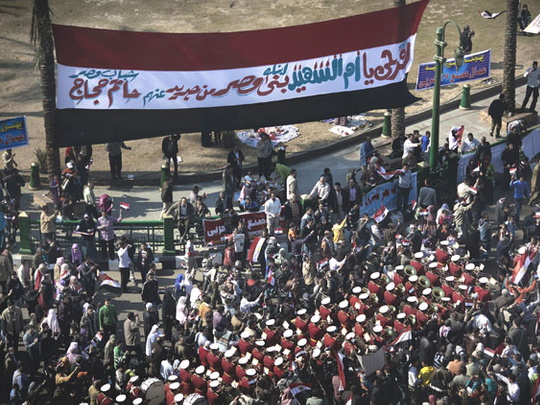
A protester in Tahrir Square told a New York Times reporter a few days before the downfall of the Mubarak regime, that the Egyptian revolution had unified the people like never before; Muslims and Christians, men and women, young men and older people, religious and secular people; the professional class as well as the working class. Then the protester added: "Today, we are all Egyptians."
Many protesters spoke movingly about the new sense of solidarity and national cohesiveness born during the 18 revolutionary days that shook Egypt and changed history.
By its scope and character, and by the nature of its revolutionary spirit; by the brilliant demonstration that a mobilised people with ordinary means could achieve extraordinary ends; the Egyptian revolution represents a splendid lesson in democracy that will be admired and studied for generations to come.
By adopting a slight variation of the slogan "We are all Egyptians" and by saying: "I am an Egyptian" a citizen anywhere in the world at once expresses an identity that is informed by the democratic spirit of the Egyptian revolution. "I am an Egyptian" may well come to mean in common parlance "I am a revolutionary for democratic freedoms and social justice."
And that is because the Egyptian Revolution, perhaps more than any other revolution, embodied a set of democratic principles that represents the cumulative wisdom on democratic governance and political, social and cultural rights.
By mobilising literally millions of people for peaceful political action in Tahrir Square and doing so repeatedly even after former president Hosni Mubarak was forced to resign, the Egyptian Revolution gave new meaning to the democratic principle of government by the people for the people.
Consider how the Egyptian Revolution went beyond other notable revolutions. The American Revolution for instance has come to symbolise resistance to tyranny; its Declaration of Independence an affirmation of the equality of all people and their inalienable rights to life, liberty and the pursuit of happiness.
But the ideals of the Revolution were not immediately translated into political realities; and slaves, black Americans, indigenous people and women remained for a long time excluded from the political process. The Egyptian Revolution, on the other hand, was consciously inclusive; the demand for social justice and democratic freedoms were made in the name of all the people regardless of religion, race, gender or creed.
Inspired by the American Revolution, the French revolutionaries proclaimed the French Declaration of the Rights of Man and the Citizen. Unlike the Russian Revolution, the Egyptian Revolution did not provoke civil war; was not proclaimed in the name of any single social class. Its revolutionary demands rejected dictatorship and authoritarian rule of any kind, and were positively embedded in democratic principles and traditions.
In adopting as its main slogan: "The people want the fall of the regime" the Egyptian Revolution gave a masterful illustration of democracy: Sovereignty resides in the people.
The Egyptian revolution rejected despotism, indicted corruption, and reclaimed the people's right to give or withhold consent, and to exercise democratic freedoms. Its demands remarkably reflected the principles of democratic governance and the principles of human rights that have become an integral part of international law.
In this sense the slogan "I am an Egyptian" may well come to acquire universal identity; its mere proclamation may come to signify the people's self-empowerment to reclaim their democratic freedoms. "I am an Egyptian" may well come to mean I am a revolutionary; I am a democrat; I am a self-empowered citizen; I am a fighter for social justice and democratic freedoms.
- Adel Safty is Distinguished Professor Adjunct at the Siberian Academy of Public Administration, Russia. His new book, Might Over Right, is endorsed by Noam Chomsky and published in England by Garnet, 2009.








